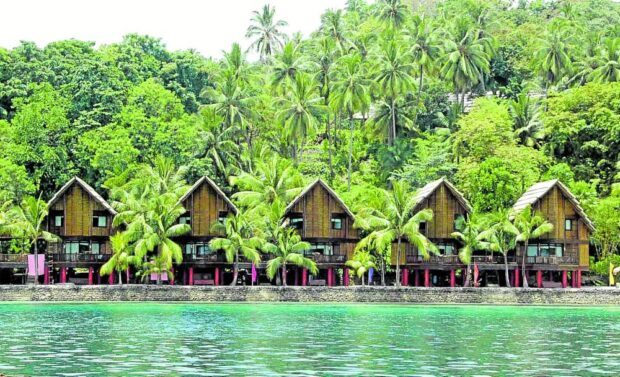
ALLURING | The cozy cottages, cool crystal waters and refreshing scenery are among the alluring features of Samal Island’s Pearl Farm Beach Resort. (Photo by BING GONZALES)
D AVAO CITY, Davao del Sur, Philippines — There are still traces of the severe and scathing impact of the COVID-19 pandemic on the economy of this city, the leading economic hub of Mindanao.
The iconic Marco Polo Hotel has yet to operate after it shut down in July 2020 as large gatherings were called off to prevent the spread of the virus.
Prior to the pandemic, Marco Polo and other hotels in the city were kept comfortably afloat by the continued stream of tourists, mostly arriving for meetings, incentive travel, convention, and exhibition (Mice) events.
In the 11 months of 2019, tourist receipts in the city amounted to P51 billion, generated from some 2.34 million arrivals. The revenues were almost double that of P26.2 billion in 2015, or within just four years.
If not for the pandemic, the arrivals could have increased by 10 percent in 2020, based on the projections of city tourism officials then.
As the crisis continued, another local tourism icon, Apo View Hotel, closed, eight months after Marco Polo did.
Given the attractions and amenities it can offer, Davao City has been a major host for regional and national events, both by the public and private sectors.
The activities of Mice tourists spill over into other areas in the Davao Region, especially the resorts in the Island Garden City of Samal which is just 10 minutes across the Davao Gulf.
In 2019, tourist arrivals in the city accounted for at least half of the entire region.
OPEN SPACES | Davao’s urban development puts premium on providing open spaces for leisure and entertainment, such as the beachfront of Waterfront Insular Hotel covered with greenery, and the park and lanes for biking and walking along the newly opened coastal road. (Photo by BING GONZALES)
Signs of recovery
Today, three years into the pandemic, signs of recovery are also evident. Among others, Apo View has already reopened, and the buildup of vehicular traffic in major junctions of the city, while posing a challenge to the management capacity of the local public safety agency, indicates an increased influx of people in this premier urban center of Mindanao.
While dependence on Mice was the local economy’s Achilles heel during the pandemic, the local government remains steadfast in making the city a mecca of Mice in the country in the years ahead.
And the prospects are good.
In time for the city’s 86th founding anniversary, it was swamped with Mice events that pump-primed its reentry into the market. First, the convention of the Integrated Bar of the Philippines, then the Mice Conference (MiceCon) 2023, which is the country’s largest gathering of tourism experts and professionals whose work helps influence the direction of the industry’s development.
(Photo by BING GONZALES)
Groups of government prosecutors and the country’s shipping industry leaders followed suit.
Davao’s recent hosting of MiceCon 2023 showcased the preparedness of the city not only for business but also for leisure travel.
The event, according to Tourism Secretary Christina Frasco, “leads the way in terms of Mice.”
“Davao has shown us the way. It has become a model for us to follow and a springboard from which we can launch even more exciting MiceCons in the future, and we will,” said Frasco, whose home province, Cebu, and its cities, are competing with the city in luring more visitors.
In her speech during the closing program of the event, Frasco said that through MiceCon, the city had also shown itself a “shining example to all Mice destinations across the country” as it “showcases new developments, cultural heritage, natural landscapes, culinary delicacies and vibrant hospitality for the world to see.”
RICH CULTURE | Davao City is a melting pot of cultures, expressed, among others, the colorful Kadayawan Festival’s street dancing competition called “indak-indak” and “pamulak,” or the float parade). (Photo by BING GONZALES)
Strength
The city last hosted the event a decade ago and won its hosting again in 2020, which was eventually aborted due to the pandemic.
The city has continued to leverage its strengths, as cited by Frasco, as well as its unique offerings as it has been carrying the tagline, “From Islands to Highlands,” emphasizing that someone can both visit the beaches in nearby Samal, a primary destination for beachgoers, and the inland resorts in areas that are near the foot of the tallest mountain in the country, the majestic Mt. Apo.
But there is still so much work to be done.
Mary Ann Montemayor, a pillar of the local tourism industry, said that among the immediate steps for the city to do was to conduct a “thorough inventory of its Mice facilities and encourage more investors to put up more facilities.”
“Pamulak,” or the float parade. (Photo by BING GONZALES)
For investors to pour in their money in these facilities, the government should offer them more incentives so they “will help fill in the vacuum.”
In 2018, LTS Holdings, known for its retail stores in Mindanao and Palawan and several tourism establishments, announced its plan to build a convention center and a world-class hotel. The plan, however, fizzled out due to the pandemic and there has been no announcement yet from the company about its recent plans.
Montemayor also pushed for the opening of more flights in order to attract more travelers, particularly those looking for spots that Davao and its nearby areas can offer.
“We still lack air connectivity,” she lamented.
Montemayor, mother of Tourism Promotions Board chief, Ma. Margarita Montemayor-Nograles, suggested that both the private sector and the government partner in, among others, improving the service standards in tourism establishments, to ensure that the city becomes the focal point of Mice in the country.